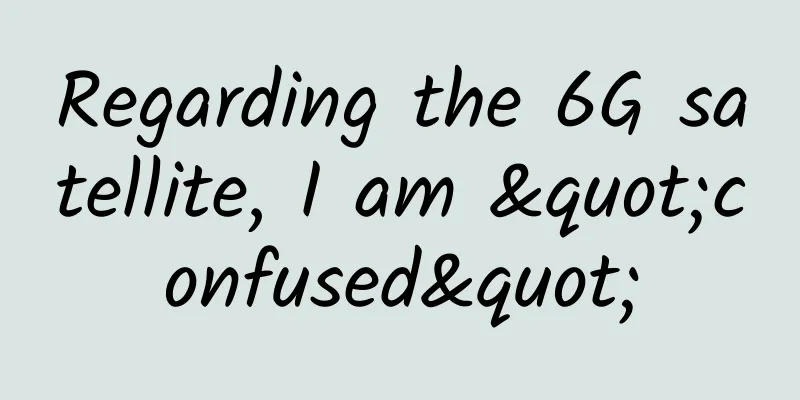Regarding the 6G satellite, I am "confused"

|
On November 6, a satellite named "University of Electronic Science and Technology" was successfully launched in Taiyuan, Shanxi, attracting widespread attention from all walks of life. The reason for the attention is that this satellite is known as the world's first "6G experimental satellite". It is equipped with a terahertz communication payload, which is regarded as a potential key technology for 6G. It will conduct terahertz technology verification in space application scenarios (a world first).
Part of a satellite To be honest, when I first saw this news, my expression was like this: There have been a lot of news about 6G recently, which is not surprising. However, moving terahertz into space and calling it a 6G experiment is really a bit "over the line" and I can't stand it at all. What is terahertz? It's very simple. Electromagnetic waves with a frequency of THz (Tera Hertz, 1THz=1000Ghz) are terahertz electromagnetic waves. The technology that uses terahertz electromagnetic waves for communication is terahertz communication. Terahertz and space-air integration have long been considered the two key technologies of 6G and are also key research directions. It is generally believed that 6G will use terahertz frequency band electromagnetic waves for communication in the future. (It should be noted that the ITU International Telecommunication Union has not held a meeting to discuss what the 6G frequency bands are, nor has it officially released the definition of the 6G frequency band, so it is not clear whether terahertz is a 6G frequency band.) At first glance, there seems to be nothing wrong with this 6G test satellite. It’s an experiment, so why not? But if you know a little about communication technology, you will find that it is full of problems (bu) and points (pu). The basic characteristic of electromagnetic waves is that the higher the frequency and the shorter the wavelength, the worse the diffraction ability of the wave. Under the same premise (same transmission power), the higher the frequency of the electromagnetic wave, the greater the penetration loss. In general, the higher the frequency of the electromagnetic wave signal, the shorter its transmission distance. (For details, see here: The relationship between frequency (wavelength) and penetration and diffraction ability) Our current 5G operating frequency bands are divided into Sub-6 bands and millimeter wave bands. The frequency band ranges are as follows: FR1 was originally 450MHz-6GHz, but the 3GPP organization later changed it to the one shown above, but the name Sub-6 was retained. I have explained to you many times before that the millimeter wave band has a significantly higher frequency than the Sub-6 band and has weaker coverage. China is still in the testing stage. Only the United States has adopted the millimeter wave band first because of insufficient Sub-6 band resources. The frequency of the terahertz band is higher than that of the millimeter wave band (1000GHz>52.6GHz), so its coverage effect can be imagined. In 2012, the China Academy of Engineering Physics conducted an experiment in the 340GHz frequency band. With a real-time communication rate of 3Gbps, what was the transmission distance? 50 meters. Although technology is advancing rapidly now, your telling me that terahertz can be transmitted for hundreds of kilometers is beyond my understanding. Using terahertz communication is not just a matter of using higher frequencies. It involves a series of issues such as RF device capabilities, material technology, and power consumption control. Even millimeter waves are not yet mature, and many institutions are still conducting research on materials science and power devices. I really don’t believe that the core terahertz devices have been tackled. Satellite testing is different from ground testing. Satellites are so small that their weight, volume and power are limited. How can they be as convenient as ground testing? There has been no breakthrough in ground testing or any practical application. How can we learn to run before we learn to walk? At present, research on terahertz is quite popular both at home and abroad, but what can be demonstrated is mainly in the fields of security inspection, and no practical application in the field of communications has been seen. Terahertz body scanner To be honest, I personally have great doubts about the purpose and significance of this 6G experimental satellite. As far as I know, the Ministry of Industry and Information Technology does not seem to have authorized relevant units to use the terahertz frequency band for experiments. I hope that the University of Electronic Science and Technology of China can clarify the details of this experiment as soon as possible to avoid misleading the public. If it is hyped by unscrupulous media, the University of Electronic Science and Technology of China should also come out to explain the situation. In addition to the above content, I would like to take this opportunity to express some of my personal views on issues related to satellite communications. Satellite communications have always been of great concern to public opinion. In particular, the "contemporary Iron Man" Elon Musk launched a "Starlink" satellite Internet plan and worked hard to launch satellites into space, making everyone think that the era of satellite Internet is about to come, and our current mobile communication technology will be obsolete, 5G will also be obsolete, and so on. Such a view is completely ignorant. I asked these people a few simple questions: The Starlink satellite orbit altitude is reported to be 550km. Do you think the internet speed it provides you can exceed that of a base station 550m away from you? There are tens of thousands of satellites covering the earth, but how many of them are above China? China now has nearly 9 million base stations, but with this density of base stations, we still complain about poor internet speeds every day. Why do we think that satellites with less than one percent of the number can do this? There are fiber optic transmission resources behind the base station, and the backhaul bandwidth is guaranteed. What about satellite backhaul? A satellite serves so many users, and the aggregated traffic must be huge. How to solve the bandwidth problem? Can it be faster than fiber optic? How low can the latency be controlled for a round trip of 1,000 kilometers? In addition, we know that more than 70% of normal human data service needs occur indoors. Can the working frequency band of satellite signals cover indoors? How is the indoor signal strength of the mobile phone satellite positioning we use? Don’t you have any idea? Millimeter waves cannot penetrate walls at a distance of several meters on the ground, let alone after being transmitted for hundreds of kilometers? Terahertz? Satellites replace base stations. What about extreme weather such as rain and snow? Do you plan to return to primitive life? Even if Musk provides satellite internet services, how much do you think it will cost? He is not doing charity, at most he will do some charity and publicity in African countries. Do you think he will provide free internet services in China and the United States? If he does, what will his employees eat? If not, do you think the industry chain maturity and cost control ability of satellite internet can compare with the ground mobile communication industry which has been developed for decades? So I say that anyone with a little common sense would not think that satellite communications will replace terrestrial mobile communications. It is undeniable that satellite communications are important and worth studying. However, for a long time to come, satellite communications will be an auxiliary to ground mobile communications systems. The oceans account for 71% of the earth's surface area, so there is no way to build base stations, so satellite communications are needed. Aircraft in the sky also need satellite communications. When disasters occur and ground systems fail, satellite communications are also needed. In the future, satellite communications may play a greater role. However, there must be ulterior motives behind the deliberate elevation of the status of satellite communications. Musk's goal is, on the one hand, to occupy space orbital resources and frequency resources, on the other hand, to serve the capital market and push up stock prices. Another goal is to do charity work and gain both fame and fortune. He totally ignores the consequences of randomly attacking satellites and polluting outer space. We should be vigilant against such behavior. |
<<: 10 Useful HTML File Upload Tips
>>: WeChat strongly promotes live broadcast in Moments, netizens are furious: it is so ugly
Recommend
Faster and better 5G is the general trend. Wi-Fi may soon be replaced by new technologies.
[[185242]] From phones to smart thermostats to TV...
Addressing the risk of permanent roaming through network localization
Over the past few years, operators and regulators...
High cost-effectiveness and high performance at your will! Huawei Cloud's best-selling server evolves again
[Original article from 51CTO.com] The global econ...
What exactly is “5G New Call”?
In today’s article, let’s talk about a very popul...
Huawei Cloud and Xinhua News Agency work together to bring news closer to you
The booming development of digital technology has...
What are baseband and radio frequency used for?
"End-to-end" is popular nowadays. Let&#...
Byte side: TCP three-way handshake, very detailed questions!
Hello everyone, I am Xiaolin. A reader was asked ...
IDC: Strong growth in enterprise WLAN market in the fourth quarter and full year 2021
According to IDC's Global WLAN Market Quarter...
Communication module, why is it so popular?
In recent years, with the rise of mobile communic...
What is cloud network?
The future of cloud is bright. By 2024, more than...
5G+edge computing is in the first stage
On March 3, 2020, GSMA released the report "...
Report: 5G will become one of the most influential technologies from 2020 to 2025
On October 26, foreign media reported that accord...
Ministry of Industry and Information Technology: The total number of 5G base stations in my country has reached 819,000
Recently, the Ministry of Industry and Informatio...
This may be the correct way to open 5G
I wonder what you think 5G should look like? Fast...
New breakthrough in 5G technology: The cost of millimeter wave equipment has been greatly reduced, and antennas can be directly "printed"
Researchers at Georgia Institute of Technology, N...









